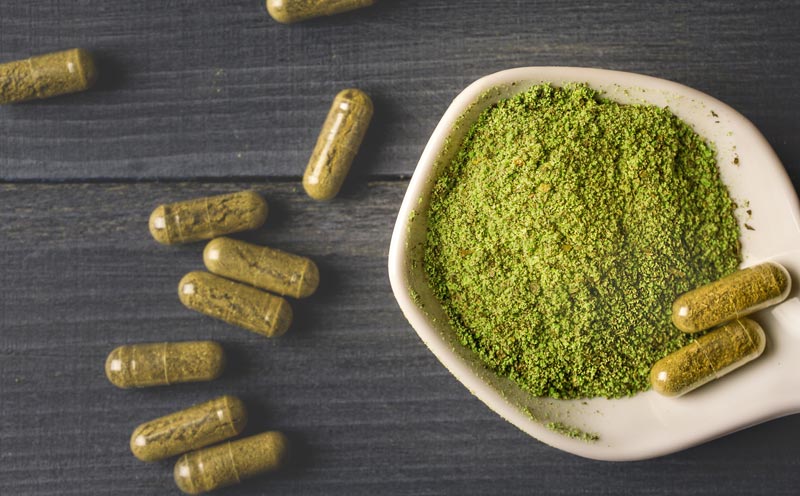Kratom is an herbal substance that was historically used for medicinal purposes. Now, it’s used as an herbal substance that can produce opioid- and stimulant-like effects. Though kratom is viewed as harmless, it has risks and can cause addiction.

There Is A Better Way To Live. It's Time To Get The Help You Deserve.
Statistics On Kratom Use, Misuse, And Addiction
An estimated 10-16 million people in the US take kratom, though the current ranges of 1.3% to 6.1% from national surveys may underestimate regular kratom users.[2] Kratom is not currently approved by the FDA or regulated, so it’s safety is uncertain. As of February 2018, the FDA cited 44 cases of kratom-associated deaths.[3]
Effects Of
Kratom Abuse
Kratom use can result in a range of effects that can last from 2 to 6 hours and can vary depending on dosage, individual differences, and the specific strain of kratom. Some of the effects can include:
- Stimulant effects like energy and alertness
- Pain relief
- Mood-enhancing effects
- Relaxation and sedative effects
- Euphoria
- Enhanced focus and concentration
- Nausea
- Opioid-like effects
- Itchiness
- Drowsiness
Can You Overdose on Kratom?
While not as common as other drugs, you can overdose on kratom. The term “overdose” differs with kratom than with opioids or other substances, however. A kratom overdose produces unpleasant side effects and adverse reactions instead of fatal outcomes, but life-threatening complications are always possible.
Signs and Symptoms of Kratom Overdose
High doses of kratom can produce signs like:
- Heavy sedation
- Respiratory depression
- Nausea and vomiting
- Dizziness and lightheadedness
What to do if you suspect someone is overdosing on kratom:
Kratom overdoses are relatively rare, but the lack of regulation with kratom products increases the risk of contamination that can lead to unpredictable effects. If you suspect someone is overdosing on kratom or experiencing an adverse reaction, treat it as a medical emergency and call 911. If possible, provide the packaging of the product to emergency medical services to help them identify possible contaminants.
Dangers of Long-Term Kratom Use
The long-term use of kratom is associated with potential risks and adverse effects, especially with the possible contamination of kratom products. Regular use can lead to tolerance, which means you need more of the substance to achieve the same effects. Dependence is also possible, which is when you find it challenging to stop using kratom without withdrawal symptoms.
Other risks of kratom use include liver toxicity, which can cause severe liver damage and liver failure, gastrointestinal issues, and psychological effects like mood swings, anxiety, and depression. With the lack of regulation, kratom products can carry risks of contamination or adulteration. The dangers of smoking kratom can include respiratory effects.
Mixing Kratom with Other Drugs
The effects of kratom and its interactions with other substances are not well understood. It’s possible that mixing kratom with other substances like alcohol or opioids can increase the risk of adverse reactions and health complications, especially if there are unknown additives.
Kratom Addiction And Abuse
The Diagnostic and Statistical Manual of Mental Disorders, Fifth Edition (DSM-5) does not currently have a diagnostic category for kratom use disorder. Kratom is associated with addiction and potential for abuse, however, which may have the following criteria as a substance use disorder:
- Using larger amounts or for a longer period than intended, unsuccessful attempts to cut down or control use
- Interference with major role obligations, such as work or school, problems with interpersonal relationships
- Use of the substance in physically hazardous situations
- Tolerance (need for increased amounts to achieve the desired effect) and withdrawal symptoms
- Significant time spent obtaining, using, or recovering from the substance
- Important activities are given up or reduced due to substance use
- Continued use despite knowledge of having a persistent or recurrent physical or psychological problem
Is Kratom Addictive?
Kratom has the potential for addiction and dependence. It contains alkaloids that can interact with the brain’s opioid receptors, which can produce opioid-like effects. Over time, you can become tolerant to kratom and may need higher amounts to achieve the desired effects. This can contribute to dependence, so you may find it challenging to stop using kratom without withdrawal.
How Addictive is Kratom?
The addictive potential of kratom is a subject of ongoing research, but it’s believed to have a lower abuse potential than opioids or other substances. Still, it’s not without the risk of dependence and addiction.
Signs of Addiction to Kratom
The signs of kratom addiction can vary, but they may be similar to signs of addiction to other substances, such as:
- Compulsive kratom use
- Loss of control over kratom use
- Sleep changes
- Neglecting responsibilities
- Social isolation
- Changes in mood and behavior
- Financial issues
- Secrecy and deception
Kratom Addiction And
Mental Health
Kratom addiction can have profound effects on mental health, influencing emotional wellbeing, cognitive function, and overall psychological stability. Excessive use of kratom can lead to dependence and addiction, including side effects like anxiety, depression, and mood swings.


Cutting Agents Used For Kratom
Sold as a product, kratom may be subject to additives, contaminants, or cutting agents that can affect the product quality or safety. These can range from inert substances like starch and talc to dangerous contaminants like heavy metals or bacteria.
Kratom Addiction Treatment
If you or a loved one is struggling with kratom addiction, help is available. Because addiction is complex, it requires an individualized care plan that considers your medical history, substance use history, and treatment goals, so the process can vary. The cost and length of your treatment also varies by the specific plan, the location, and the facility.
Kratom Addiction Treatment Levels of Care
Addiction treatment levels of care are designed to provide you with the most tailored treatment and support for each stage of your recovery journey.
- Medical detox: Kratom withdrawal can cause uncomfortable symptoms that make it challenging to quit. Detox provides supervision and support from a medical team to keep you as comfortable as possible during the process and prevent adverse effects.
- Inpatient treatment: Inpatient treatment is ideal for people who need more intensive care in their recovery process. You stay in a facility 24/7 and receive care and support from staff and peers to set the foundation for your recovery.
- Outpatient treatment: Outpatient treatment is a more flexible option for people who need to balance their treatment with personal responsibilities. You can attend treatment sessions on a set schedule and return home to sleep in your own bed and spend time with family.
- Aftercare: Once formal treatment is complete, aftercare programs provide support and resources to help you transition into everyday life and commit to long-term sobriety.
Therapies Used in Kratom Addiction Treatment
Addiction therapies vary according to your tailored treatment plan. They may include:
- Cognitive behavioral therapy
- Nutritional counseling
- Group therapy
- Experiential therapy
- Somatic experiencing
- Eye movement desensitization and reprocessing (EMDR) therapy
- Outdoor recreation
Co-Occurring Disorders
Co-occurring disorders are when substance use disorders coincide with mental health disorders. The presence of two disorders and their influence on each other can complicate treatment, so an integrated approach is necessary for better outcomes. Kratom addiction commonly co-occurs with anxiety, depression, and mood disorders.
How to Find Kratom Addiction Treatment in Orange County
If you’re seeking kratom addiction treatment, the first step is to speak to your primary care provider or insurance company to discuss approved treatment options or providers. You can also find help through the Behavioral Health Services Locator tool offered by SAMHSA.
Once you find some treatment facilities and program, make sure to do your due diligence and check into the reviews and testimonials to learn about other client experiences.
Learn More About Our Programs
Kratom Detox And Withdrawal Management
Kratom contains alkaloids that interact with opioid receptors, so if you stop use, you can experience unpleasant kratom withdrawal symptoms that can encourage relapse. Attending a detox program for kratom withdrawal treatment is an integral part of addiction treatment to keep you comfortable during withdrawal and form a foundation for the next stage of recovery.
Frequently Asked Questions
Is Kratom Legal?
The current laws and regulations can change over time, but kratom is legal in many states and jurisdictions. However, some states have enacted laws to regulate or restrict the sale and use of kratom. In some countries, kratom is either prohibited or controlled.
Does Kratom Have Medical Uses?
Kratom has no FDA-approved or medically accepted uses, but it can be used therapeutically as an alternative to painkillers. It has been used for medicinal purposes throughout its history in native regions.
How Is Kratom Sold?
Kratom is available in many forms with different consumption methods. Powdered kratom is one of the most common forms on the market, but it also comes in capsules, extracts, dried leaves, resin, infused edibles, and topicals like creams, balms, and salves.
Does Kratom Cause Nausea?
Yes, kratom can cause nausea.
Sources
[1] 2021 NSDUH Annual National Report. SAMHSA.gov. (n.d.-b). Retrieved from https://www.samhsa.gov/data/report/2021-nsduh-annual-national-report on 2023, November 22.
[2] Swogger, M. T., Smith, K. E., Garcia-Romeu, A., Grundmann, O., Veltri, C. A., Henningfield, J. E., & Busch, L. Y. (2022, February 2). Understanding Kratom use: A guide for healthcare providers. Frontiers. Retrieved from https://www.frontiersin.org/articles/10.3389/fphar.2022.801855/full on 2023, November 22.
[3] Swogger, M. T., Smith, K. E., Garcia-Romeu, A., Grundmann, O., Veltri, C. A., Henningfield, J. E., & Busch, L. Y. (2022, February 2). Understanding Kratom use: A guide for healthcare providers. Frontiers. Retrieved from https://www.frontiersin.org/articles/10.3389/fphar.2022.801855/full on 2023, November 22.


